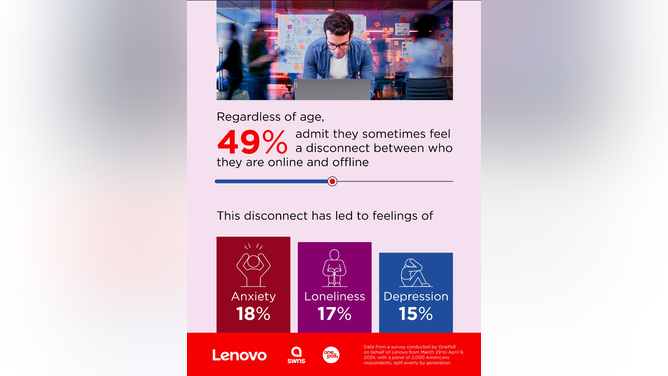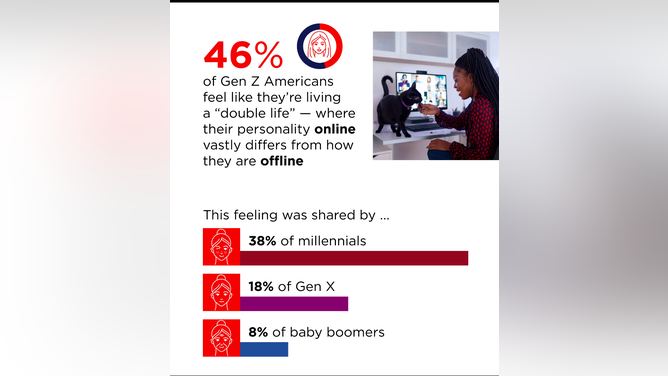Gen Zers Are Living a 'Double Life' -- Between Online and Offline
Almost half of Gen Z Americans feel like they’re living a "double life," where their personality online vastly differs from how they present themselves in the real world.
"The survey of 2,000 American respondents, split evenly by generation, found that 46 percent of Gen Z respondents feel this duality," reported the New York Post, citing results from a survey conducted by OnePoll on behalf of Lenovo.
"But they’re not the only ones: this feeling was shared by 27 percent of respondents across generations, with 38 percent of millennials experiencing this, as well as 18 percent of Gen X and 8 percent of baby boomers."
And the younger the generation, the more likely they are to keep their online persona a "secret" from their family. Just more than 3 percent of Gen Z respondents admitted their online world is a secret, while 27 percent of millennials said the same.

Via SWNS / Lenovo

Via SWNS / Lenovo
The "double life" trend stems mostly from younger Americans wanting to fit in with the in-crowd, which differs from on social media and in the public. Social media often rewards toxic and tribalistic posts with engagement.
It's harder to be a tough guy in person.
However, a recent Pew study found that more than 60 percent of Americans are afraid to post their honest opinions online. So, they self-censor or pretend to agree with opinions with which they do not actually agree.
I spoke about self-censorship and Americans overvaluing the opinions of social media users while guest hosting "The Will Cain Show" on Fox News Digital Tuesday.
You can watch/listen below:
Regardless of age, 49 percent of respondents said they feel a "disconnect" between who they are online and offline. The polling found that the disconnect has led to feelings of anxiety (18 percent), loneliness (17 percent), and depression (15 percent).
"Around one in five of the world’s young people have a mental health condition, reflecting a global crisis. We are committed to developing smarter technology to address some of the world’s most pressing issues," explained Gerald Youngblood, CMO, Lenovo North America.
"Advancements in AI and smarter technologies allowed us to explore new and creative ways to use technology for good. We hope this social experiment will drive more conversations between friends and family about the need to understand each other’s worlds for the sake of mental wellbeing."
Ultimately, people often channel a more inauthentic version of themselves online. They do so by measuring their approval by likes, retweets, and nice/nasty comments.
Consequently, they put their happiness in the hands of strangers. That's concerning.
We are losing a sense of who we are by caring so much about what algorithms tell us to care about. Social media pressure is making our younger generations more submissive – leading to "double lives."